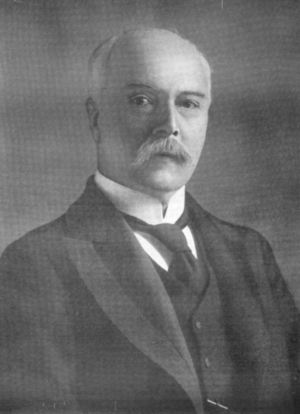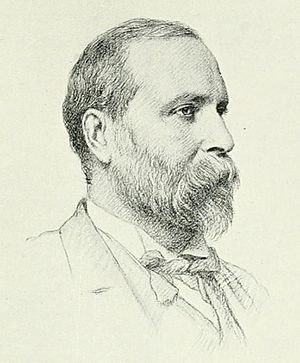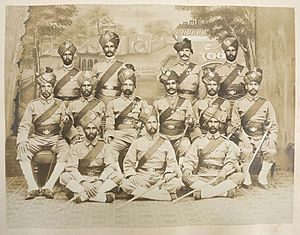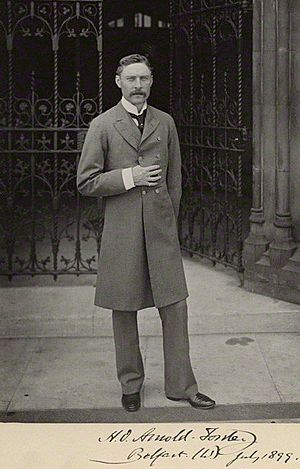Colonial Defence Committee facts for kids
The Colonial Defence Committee (CDC) was a special group that worked for the British Colonial Office from 1885 to 1908. In the late 1800s, the British Army was taking its soldiers out of the colonies. The idea was that the colonies would create their own local armies. After Russia won a war in 1877–1878, Britain worried more about the safety of its colonies. A short-term group looked into colonial defence. The CDC took its place and had its first meeting on 22 April 1885.
One of the CDC's first tasks was to ask colonial governments about their defences. They wanted to know how many soldiers and supplies they had. The CDC was worried about surprise attacks. So, they gave advice to colonial governors on how to get ready and respond. The CDC asked each colony to make a local defence plan for the committee to check. The CDC suggested ways to make these plans better. For example, one suggestion led to the creation of the Hong Kong Regiment. In some places, like Saint Helena, the local governments didn't have enough money. In these cases, the British government paid for the defence plans made by the CDC.
The CDC kept the rule that land defence was the job of the colonial governments. The powerful British Navy would help protect the seas. The committee also suggested that colonial troops should use the same equipment and training as the British Army. This would help them work together better. However, not all colonial governments liked this idea. They worried about getting pulled into foreign wars. The British Army didn't do very well in the 1899–1902 Second Boer War. This led to big changes in defence, including the creation of the Committee of Imperial Defence (CID). The CID had more important members and more political power. The CDC became less important and was later joined with the CID. In 1908, it was renamed the Overseas Defence Committee.
Contents
Why the Committee Was Started
In 1870–71, the British government took its regular army soldiers out of colonies that governed themselves. This was a big step for the British Empire. It also saved the main government a lot of money. Colonial governments were expected to create their own forces. These forces would handle local policing and protect borders. This change also helped the British Army gather its forces and become more effective.
However, colonial governments were slow to create their own troops. They didn't want to pay for them, as the costs would fall on local taxpayers. The colonies also struggled because the regular British troops, who could have taught and advised them, were gone. They only got occasional advice from Navy officers or a few officers from the War Office.
The British government worried that colonial defence was being ignored. This was a big concern during the "Russian war scare" of 1878–79. This happened after Russia won a war in 1877–78. During that war, the Secretary of State for the Colonies, Sir Michael Hicks Beach, had a special group check the defences of some key ports in the colonies. They found the defences were not good enough. They needed many improvements and more cannons. After the war, this special group was closed down.
After the war, Hicks-Beach was still worried about colonial defence. He set up a new group called the Royal Commission Appointed to Enquire into the Defence of British Possessions and Commerce Abroad. This group was led by Lord Carnarvon. The commission found that many colonial governments couldn't answer their questions. This meant Navy officers had to investigate.
The commission suggested taking British soldiers out of Barbados. But a colonial leader named Robert Henry Meade stopped this. He worried that the colonial government didn't know enough to protect the ports. Meade talked with other leaders and military officers. They all agreed that a small committee in the Colonial Office was needed. This committee would help organize defence plans. The Colonial Defence Committee (CDC) was approved. It met for the first time on 22 April 1885, to talk about Barbados's defence. The committee was made up of both army and navy officers. The first chairman was Sir Andrew Clarke. One of its early secretaries was Captain George Clarke.
Early Work of the Committee
The worries about Russia had caused panic in some colonies. For example, the Governor of British Ceylon, James Robert Longden, moved a lot of coal and the colony's money inland. The CDC wanted to stop such overreactions in the future. So, a Local Defence Committee was set up in all colonies. These local groups would make defence plans. The CDC would then check and approve these plans. The main goal was to defend the colonies if a big war broke out in Europe.
One of the CDC's first decisions was to find out how good colonial defences were. No one had been regularly reporting on this. In August 1885, the CDC asked colonial governments to report on their naval and land defences. They wanted to know how many weapons, ammunition, and naval mines they had. They also asked about electrical and telegraph cables, and the number of soldiers in the colony.
The CDC was concerned about a sudden attack on a colony. They gave advice to colonial governors on what to do if war started. The CDC warned governors not to let more than two foreign warships or one foreign troopship into a harbour at once. They also warned that any break in telegraph lines might mean war had begun. Governors were told to guard cable routes, set up mines, and turn off lights at night. Food, coal, and money also needed to be protected.
Defence Plans and Colonial Troops
By October 1891, the first 19 local defence plans were ready. Canada was one of the slowest to prepare its plan, which worried the CDC. Canada only started working on its plan after the Colonial Secretary, Joseph Chamberlain, stepped in. By October 1891, the CDC had checked some local plans. They had made the first 150 of their suggestions to governors.
One early suggestion was made on 6 August 1888. It was to add a battalion (a group of soldiers) to the army in Hong Kong. This would double the number of foot soldiers there. This led to the creation of the Hong Kong Regiment from the British Indian Army to serve there. Between 1895 and 1905, the CDC itself made plans for the defence of Jamestown, Saint Helena. They thought this place was easy to attack and losing it would harm trade in the South Atlantic. The British government paid for these defence measures. This was because the local economy was not strong enough.
The CDC and the War Office believed that British imperial troops should not be responsible for guarding the colonies. Colonial troops, who worked for the Colonial Office, should protect them. However, imperial troops could be sent to British property, like Royal Navy coaling stations.
The CDC strongly suggested that colonial troops should have the same equipment and training. This would help them work together better on the battlefield. This could create a large group of colonial troops, maybe up to 10,000 from Canada, Australia, and South Africa. These troops could be called upon to fight alongside the British Army quickly. But some colonial governments, like Canada and Australia, didn't like these plans. Many people in these places did not want to get involved in foreign wars. The War Office decided on a middle ground. They would slowly work towards standardizing and professionalizing the colonial forces. But the colonies would not have to promise in advance that their troops could be sent overseas.
The Committee's Decline
Colonial troops performed well in the 1899-1902 Second Boer War. This made British politicians like Archibald Primrose, 5th Earl of Rosebery want to use colonial forces more in British wars. However, the government was focused on changing the imperial troops. This was due to several reports and the creation of the Committee of Imperial Defence (CID) in 1904. These events made the CDC less important. It was not well-equipped to talk with the colonies about sending their troops to war. The CDC found it could not do much in an argument between British and Canadian politicians. This argument was about who would command the Canadian militia. In the end, London agreed that the British general in command would be replaced by a Canadian military council.
The CDC was mainly a group of military experts. The CID, however, had more senior people and included political figures. The Secretary of War from 1903-1905, H. O. Arnold-Forster, had suggested closing down the CDC. This happened when a CID plan to reduce the British army in the West Indies got stuck, waiting for CDC approval. The Colonial Office and General James Grierson opposed this. Arnold-Forster was partly successful. The CDC became a part of the CID. In 1908, it was renamed the Overseas Defence Committee.
What the Committee Left Behind
The CDC is seen as the starting point for the more powerful CID. When the CID was founded, it chose George Clarke, an early secretary of the CDC, as its first secretary. The CDC was the first British government group to regularly check the defence of the colonies. It was also one of the few groups to consider both land and sea defence. At that time, army and navy policies sometimes disagreed. Like other British government groups in the 1800s, the CDC did not keep detailed notes of its meetings. However, its official papers still exist. In 1909, one of the CDC's ideas came true. A meeting with Dominion governments led to an agreement. Their armed forces would receive the same training as the British War Office. The goal was for them to become a "homogenous Imperial Army," meaning they would all work together in the same way.
 | Jackie Robinson |
 | Jack Johnson |
 | Althea Gibson |
 | Arthur Ashe |
 | Muhammad Ali |





